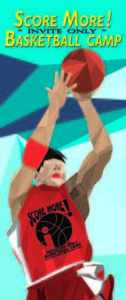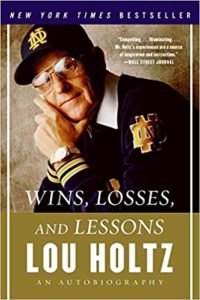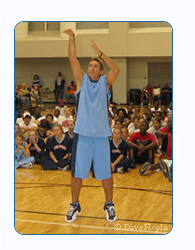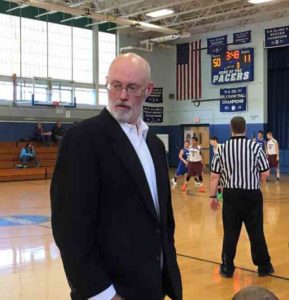 The first Score More Basketball Camp by InviteOnlyBasketball.com was held last Saturday at Keene State College and for all those who attended, it went over very well. Campers came from as far away as Rhode Island and each camper got a great looking, reversible practice jersey to take home.
The first Score More Basketball Camp by InviteOnlyBasketball.com was held last Saturday at Keene State College and for all those who attended, it went over very well. Campers came from as far away as Rhode Island and each camper got a great looking, reversible practice jersey to take home.
Highlights…
 Parisi Speed School presented the first session and showed drills to improve agility and explosive movement. Ben from Parisi also tested each camper for their vertical leap while providing pointers along the way. Each camper got a “Speed Pass” for a free session of Parisi Speed School at the Summit facility in Marlborough, NH and there loads of other prizes from Parisi during their highly energetic and engaging session.
Parisi Speed School presented the first session and showed drills to improve agility and explosive movement. Ben from Parisi also tested each camper for their vertical leap while providing pointers along the way. Each camper got a “Speed Pass” for a free session of Parisi Speed School at the Summit facility in Marlborough, NH and there loads of other prizes from Parisi during their highly energetic and engaging session.
Keene State Associate Head Coach Tyler Hundley helped out with the second session focused on shooting. Coach Hundley scored over 1000 points in his high school career and gave the campers insights into what it takes to become a scorer. He also gave each camper specific feedback as they put up 100 shots on Keene State’s Shooting Machine (aka The GUN).
Keene State Men’s Head Basketball Coach Ryan Cain, who himself scored over 1800 points in his college career, stopped by and spoke to the campers as well.
The shooting / scoring session included loads of shooting drills at various distances and against different challenges (defense, competition). In total, each camper must have put up over 500 shots!
Scoring Moves were also discussed including the 29 Signature Moves of some of the best NBA players. Here is the link to Coach Wheeler’s blog where he presents the list of moves along with a video showing clips of the moves. 29 Signature Basketball Moves
The final session, after a number of shooting contests, 3-on-3 and 1-on-1 contests, focused on the mental aspects of competition. Coach Dave Wheeler ran the campers through a “scorer’s meditation” which focused on the skill of mindfulness. Obviously one meditation won’t give you complete control of your mind, but it was a good introduction to a skill that will allow you to disregard distractions while being present for key experiences so you can perform at your best. The concept of visualization was also presented, combined with the relaxation process of meditation, as a way to improve your shooting while also resting your body.
 The camp ended with awards based on the contest results and, as an added bonus, all campers got to meet Croix Sather, a friend of Coach Wheeler’s who had stopped by to help with the videotaping of the event. Croix is a keynote speaker and author who ran across the United States, from San Diego to New York City, doing 100 marathons in 100 days. He also spoke 100 times, mostly to at-risk groups, as he ran across the country. Each camper also got a copy of Croix’s book, “Dream Big, Act Big”.
The camp ended with awards based on the contest results and, as an added bonus, all campers got to meet Croix Sather, a friend of Coach Wheeler’s who had stopped by to help with the videotaping of the event. Croix is a keynote speaker and author who ran across the United States, from San Diego to New York City, doing 100 marathons in 100 days. He also spoke 100 times, mostly to at-risk groups, as he ran across the country. Each camper also got a copy of Croix’s book, “Dream Big, Act Big”.
Overall it was a great day with lots of great information, challenging drills and so much more. Keene State College is an excellent location for the camp and everyone involved was incredibly supportive. We are looking forward to doing it again next year !
What could have been better?
Attendance was lower than we would have liked but everyone involved got some great value out of the camp. The lower numbers also allowed us to give more attention to each camper and give everyone a chance to use KSC’s GUN. (Rated as one of the highlights by the campers.)
Marketing will need to be expanded and when we schedule the Fall Camp in 2017, we should be able to market via events throughout the Spring/Summer/Fall leading up to the November event. With the video of Coach Wheeler’s “Mindset” session, we may even be able to get speaking opportunities at other camps or events in 2017.
Expanded middle & high school connections and a longer, multi-point marketing program with the schools around Keene would also have helped. Coach Wheeler had a few connections but more will be developed through the 2016-17 basketball season.
Scheduling would also have been better if we were at least one weekend later. After picking Nov.5th (based on availability of the facility at Keene State), Coach Wheeler learned that there was one more AAU tournament on that weekend. Since AAU players are a prime audience for InviteOnlyBasketball.com, it would have been better to have the camp later, perhaps the second or even third weekend of the month.
Looking forward to next year’s
pre-season basketball Camp…
There will definitely be another camp next year. If you or someone you know would like to be part of it, be sure to apply for an invitation over at www.InviteOnlyBasketball.com. This way you will get “into our system” and we will be sure to let you know as more information about the next camp becomes available. Hope to see you at a basketball camp soon !
 I rarely endorse or encourage my readers to listen to a podcast interview … unless it includes valuable information for basketball coaches or players. The link below to a recent Pure Sweat podcast interview with “Super Coach” Michael Burt definitely falls into the category of good information. Coach Burt has some excellent ideas that will help you build a winning mindset within your program.
I rarely endorse or encourage my readers to listen to a podcast interview … unless it includes valuable information for basketball coaches or players. The link below to a recent Pure Sweat podcast interview with “Super Coach” Michael Burt definitely falls into the category of good information. Coach Burt has some excellent ideas that will help you build a winning mindset within your program.









